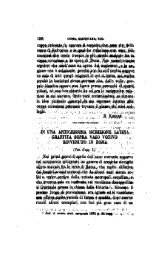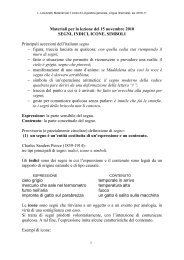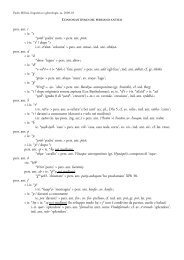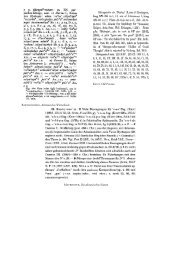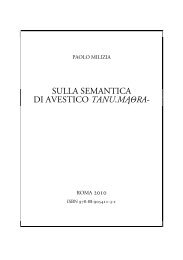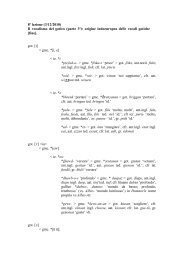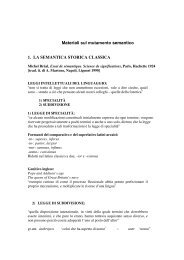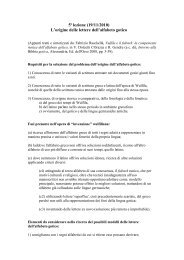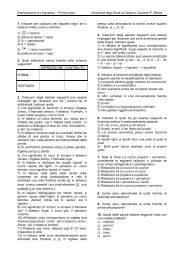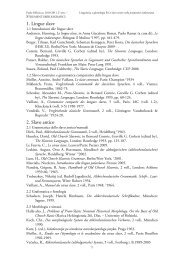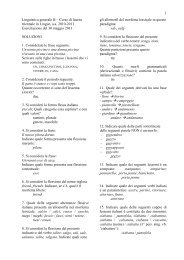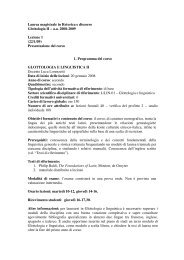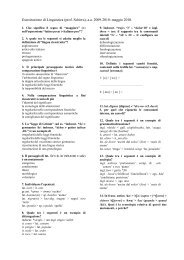Linguistic Society of America
Linguistic Society of America
Linguistic Society of America
You also want an ePaper? Increase the reach of your titles
YUMPU automatically turns print PDFs into web optimized ePapers that Google loves.
THE INSCRIPTION OF DVENOS<br />
only for the intentionally enigmatical character <strong>of</strong> the text which is<br />
thereby produced. Thus an archaic form might be used with the in-<br />
tervocalic S, even though rhotacism had normally entered into such<br />
groups <strong>of</strong> sounds. TOITESIAI is a personal name or its virtual equiva-<br />
lent and might well resist rhotacism for some time longer than an ordi-<br />
nary word; or it might be a country form, cf. such doublets as Valerius<br />
and Valesius among proper names <strong>of</strong> later times. As for the passive<br />
infinitive in -i, there is no evidence that it goes back to an earlier -ei<br />
from a primitive -ai, for the first inscriptional examples showing El<br />
are <strong>of</strong> the year 117 B.C., when I and ei had long been confused; and<br />
there is nothing which if added to a final -ei would produce the -ier <strong>of</strong><br />
the alternative form <strong>of</strong> the infinitive, common in the works <strong>of</strong> Plautus,<br />
whose date makes it impossible to take it as an extension <strong>of</strong> a form in<br />
which the final diphthong had already become a monophthong.6'<br />
Thus the objections to PAKARI as an infinitive are eliminated; but<br />
there are also positive objections to PAKARI as an adjective. If it be<br />
taken as for *pacrim, there is an anaptyctic vowel; but the anaptyctic<br />
vowel <strong>of</strong> Latin was not a, but e, and if we take recourse to the dialects,<br />
that <strong>of</strong> Oscan had the same quality as the vowel which adjoined the<br />
liquid or other sound mainly responsible for the phenomenon. Thus an e<br />
or an i might develop in *pacrim, but not an a. Lindsay's alternative<br />
suggestion66 that PAKARI is from a stem *pacdri-, falls because the<br />
suffix -ari- is merely a dissimilated form <strong>of</strong> the suffix -dli- which devel-<br />
ops after another 1 in the stem. A *pacdriom with syncope is equally out<br />
<strong>of</strong> the question, since the r is here the product <strong>of</strong> rhotacism. Nothing is<br />
gained by regarding PAKARI as other than a passive infinitive.<br />
To return to ASTED, the interpretation adstet, with a carrying over <strong>of</strong><br />
the negative <strong>of</strong> the first line, is rather forcing the matter. The three<br />
lines are separated by such gaps that the separation cannot be unin-<br />
tentional; and as I have said, we may expect the lines to be reasonably<br />
independent in syntax and in meaning. After the 'may the Maid not be<br />
kind to thee' <strong>of</strong> the first line, and before the 'unless thou wilt ...'. <strong>of</strong><br />
the second line, we should look for something like 'but may she torture<br />
thee'. Three interpretations fit this view: ASt TED with an implied<br />
torqueat or the like would mean 'but (may she torture) thee'; AbS TED<br />
with an implied verb <strong>of</strong> alo<strong>of</strong>ness would mean 'from thee (may she<br />
stand alo<strong>of</strong>)'; AbSTED would mean 'may she stand away (from thee)'.<br />
I am not particularly concerned which <strong>of</strong> these three views is to be<br />
tt Cf. F. Sommer, Handb. d. lat. Laut- u. Formen1.>3 593-4.<br />
u Handbook <strong>of</strong> Latin Insc. 20.<br />
219



